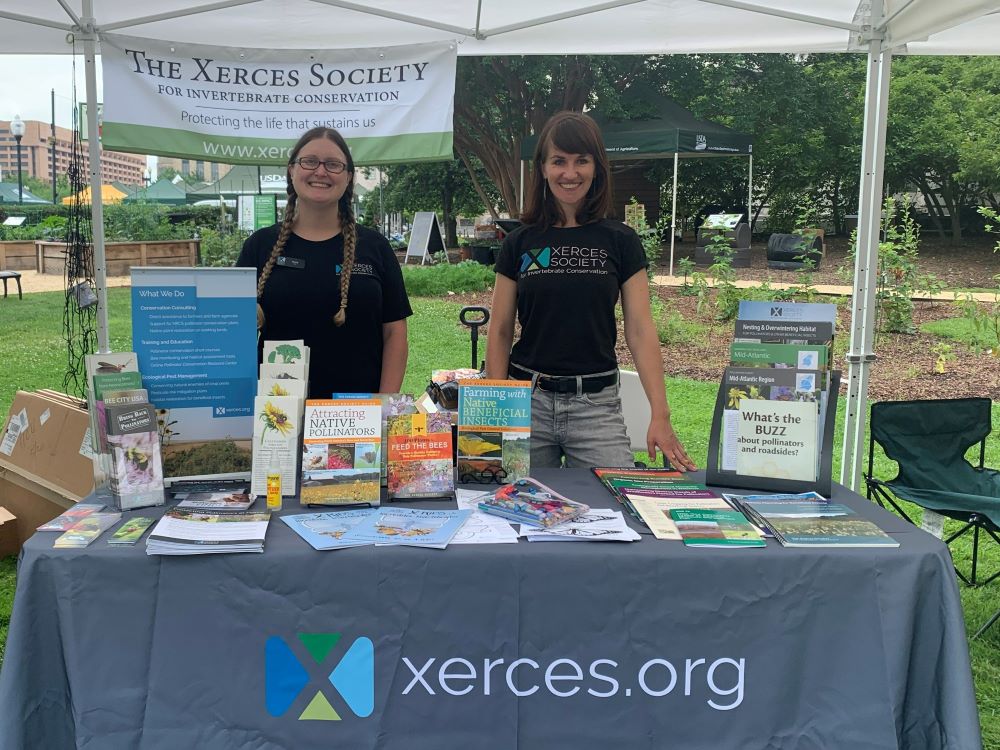Last week, myself, Sarina Jepsen, and Sarah Hoyle of Xerces joined a two-day Monarch Butterfly Summit at the U.S. Capitol Visitor Center in Washington, DC. Hosted by Oregon Senator Jeff Merkley in collaboration with the Department of the Interior, the event brought together key stakeholders to discuss solutions to reverse the declining monarch butterfly, particularly the western monarch population.
As part of the Summit, Senator Merkley and Secretary of the Interior Deb Haaland announced $1 million for western monarchs that will go to the National Fish and Wildlife Foundation for western monarch grants. In addition, they announced the establishment of a Pollinator Conservation Center of the U.S. Fish and Wildlife Service, whose first hire will be a western monarch coordinator.
 Attendees of the Monarch Butterfly Summit at the U.S. Capitol Visitor Center in Washington, DC. (Photo: Scott Black/ Xerces Society)
Attendees of the Monarch Butterfly Summit at the U.S. Capitol Visitor Center in Washington, DC. (Photo: Scott Black/ Xerces Society)
Senator Merkley has been a champion for conservation since he entered the senate. Mace Vaughan and I have worked with his staff in the past on improving pollinator provisions in the Farm Bill, and I have had the pleasure of meeting with him several times. He is also very interested and worried about western monarchs. Sarina, Jennifer Hopwood Emma Pelton, and I worked with his staff on the Monarch and Pollinator Highway Act (which passed but is awaiting funding) and the Monarch Action, Recovery, and Conservation of Habitat Act of 2021 (or MONARCH Act). Sarina also met with him at Pismo Beach to see overwintering monarchs during this past year.
The Senator convened the Monarch Butterfly Summit to elevate the conservation issues that western monarchs face, and to include policy makers in work sessions to identify solutions. Working closely with the USFWS and Xerces, Senator Merkley ensured that issues like pesticides, the availability of early emerging native milkweeds in the spring breeding areas, loss and degradation of western monarch overwintering sites, and other important issues would be highlighted throughout the meeting. Sarina and Sarah did an amazing job representing Xerces – not only in their talks, but in the working groups.
This event raised the profile of western monarchs. One participant that came up to me enthusiastically and said, “This was incredible. I have been working on monarchs for decades and never expected to come to a meeting where three U.S. Senators [Merkley, Padilla-CA, Wyden-OR] a congressperson [Panetta-CA] and the Secretary of Interior [Deb Haaland] come to talk about western monarchs!”
We hope will lead to additional focus on key priorities for recovering the western monarch population, such as the essential need to protect overwintering sites and invest in their restoration, and the need to scale up the production of early-emerging native milkweeds, such as Asclepias californica, to support the first generation of monarchs in the Priority 1 Restoration Zone and a focus on protecting habitat from insecticides that can harm monarchs.
 Next door to the Monarch Summit at the National Mall, Xerces staff Kelly Gill and Kass Urban-Mead were sharing information with the public as part of National Pollinator Week. (Photo: Scott Hoffman Black.)
Next door to the Monarch Summit at the National Mall, Xerces staff Kelly Gill and Kass Urban-Mead were sharing information with the public as part of National Pollinator Week. (Photo: Scott Hoffman Black.)
I want to give a shout out to our partners in this, including Senator Merkley’s staff, USFWS staff and the researchers and conservation partners who presented at this meeting, including Matt Forister, Amanda Barth, Ryan Drum, Wayne Thogmartin, Cat Darst, Wendy Caldwell, Francis Villablanca, Louie Yang, Cheryl Schultz, and Elizabeth Crone. I also want to recognize our members and supporters who form a network of conservationists working to bring back monarchs, as well as so many other vulnerable invertebrates.
Also, I’d like to thank our incredible staff at Xerces: Sarina Jepsen for her direct efforts providing input on the summit, as well as all the people that have made western monarchs a priority with our partners: Emma Pelton, Jessa Kay Cruz, Aimee Code, Angela Laws, Deedee Soto, Isis Howard, Sarah Hoyle, Mace Vaughan, Stephanie Frischie, Matthew Shepherd, Emily May, Deborah Seiler, Maddy Kangas, the membership, grants and ops teams, the Bee Better Certified team working in CA, and I might as well add the rest of Xerces as I think I could go on and on! It is a group effort to drive conservation and I feel Xerces has one of the best groups of people working on these issues anywhere, and we have the best group of any non-profit I know!



